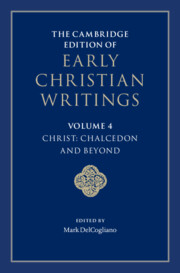Book contents
- The Cambridge Edition of Early Christian Writings
- The Cambridge Edition of Early Christian Writings
- The Cambridge Edition of Early Christian Writings
- Copyright page
- Contents
- Notes on Contributors
- Acknowledgments
- Note on the Texts and Translations
- Abbreviations
- Series Introduction
- Introduction
- Part I The Council of Chalcedon and Its Reception
- Part II Christological Perspectives after Constantinople II
- 20 Emperor Justin II, The Second Henotikon
- 21 Gregory the Great, Selections from his Homilies
- 22 Gregory the Great, Letters 1.24, 10.21, and 11.52
- 23 Anonymous Apology for Narsai
- 24 Babai the Great, On the Union 9 and 17
- 25 Sophronius of Jerusalem, Synodical Letter 1.6 and 3.1–17
- 26 Ekthesis of Emperor Heraclius
- 27 Maximus the Confessor, Ambiguum 31 to John
- 28 Maximus the Confessor, Ambiguum 5 to Thomas
- 29 Maximus the Confessor, Opusculum 3
- 30 Maximus the Confessor, Opusculum 6
- 31 Maximus the Confessor, Opusculum 7
- 32 Typos of 647/8
- 33 Acts of the Lateran Synod (October 649): Selected Proceedings and the Synodal Definition
- 34 Acts of the Third Council of Constantinople (680–681): Selected Proceedings and the Synodal Definition
- 35 John of Damascus, On Composite Nature against the Leaderless
- 36 John of Damascus, On the Faith against the Nestorians
- 37 John of Damascus, An Exact Exposition of the Orthodox Faith 57–58
- Suggestions for Further Reading
- Scriptural Index
20 - Emperor Justin II, The Second Henotikon
from Part II - Christological Perspectives after Constantinople II
Published online by Cambridge University Press: 11 February 2022
- The Cambridge Edition of Early Christian Writings
- The Cambridge Edition of Early Christian Writings
- The Cambridge Edition of Early Christian Writings
- Copyright page
- Contents
- Notes on Contributors
- Acknowledgments
- Note on the Texts and Translations
- Abbreviations
- Series Introduction
- Introduction
- Part I The Council of Chalcedon and Its Reception
- Part II Christological Perspectives after Constantinople II
- 20 Emperor Justin II, The Second Henotikon
- 21 Gregory the Great, Selections from his Homilies
- 22 Gregory the Great, Letters 1.24, 10.21, and 11.52
- 23 Anonymous Apology for Narsai
- 24 Babai the Great, On the Union 9 and 17
- 25 Sophronius of Jerusalem, Synodical Letter 1.6 and 3.1–17
- 26 Ekthesis of Emperor Heraclius
- 27 Maximus the Confessor, Ambiguum 31 to John
- 28 Maximus the Confessor, Ambiguum 5 to Thomas
- 29 Maximus the Confessor, Opusculum 3
- 30 Maximus the Confessor, Opusculum 6
- 31 Maximus the Confessor, Opusculum 7
- 32 Typos of 647/8
- 33 Acts of the Lateran Synod (October 649): Selected Proceedings and the Synodal Definition
- 34 Acts of the Third Council of Constantinople (680–681): Selected Proceedings and the Synodal Definition
- 35 John of Damascus, On Composite Nature against the Leaderless
- 36 John of Damascus, On the Faith against the Nestorians
- 37 John of Damascus, An Exact Exposition of the Orthodox Faith 57–58
- Suggestions for Further Reading
- Scriptural Index
Summary
Justin II became emperor upon the death of his uncle Justinian. During the first eight years of his reign (565–573), that is, before he descended into madness, Justin worked hard to establish a foundation on which the various Chalcedonian and anti-Chalcedonian communities could reconcile. He convened a series of conferences that, despite their contentiousness, culminated in Justin issuing this edict in 571. Sometimes labeled the Second Henotikon because of its similarity in aim and strategy with Emperor Zeno’s Henotikon from nearly a century earlier, this edict drew heavily on Emperor Justinian’s Edict on the Orthodox Faith from 551 with a few crucial differences. Justin II deemphasized “two nature” language and shifted toward a “one nature” formulation: he insisted that God the Word was hypostatically united with the human nature to the extent that the two natures of Christ could only be distinguished theoretically. In fact, most of the edict is little more than a string of quotations from Justinian’s Edict on the Orthodox Faith, carefully modified to lesser or greater extents and subtly selected and woven together to express a Christology that could be the basis for reconciliation.
- Type
- Chapter
- Information
- The Cambridge Edition of Early Christian Writings , pp. 393 - 397Publisher: Cambridge University PressPrint publication year: 2022

